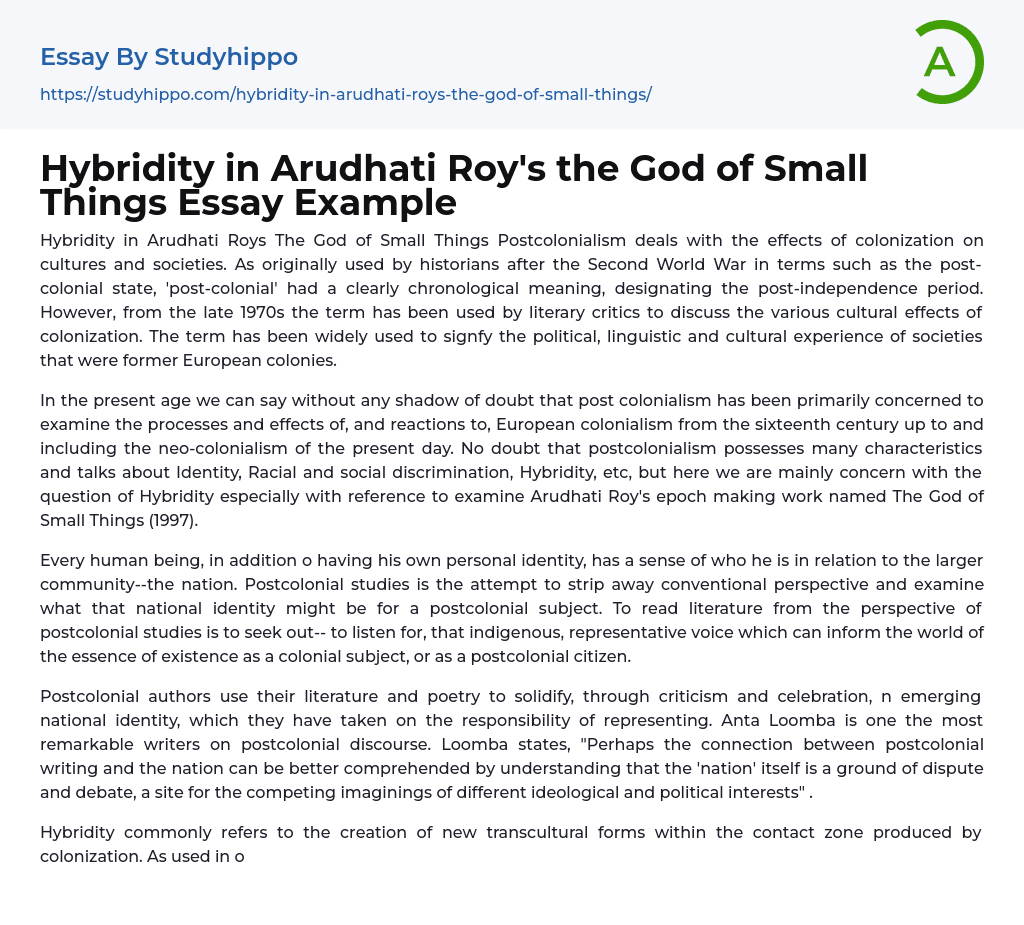

Hybridity in Arudhati Roy’s the God of Small Things Essay Example
The concept of hybridity in Arudhati Roy's The God of Small Things explores the influence of colonization on cultures and societies. Historically, the term "post-colonial" was primarily used by historians to refer to the period after independence following the Second World War. However, literary critics have now adopted this term to analyze the cultural effects of colonization. Post-colonialism is commonly employed to discuss the political, linguistic, and cultural encounters faced by former European colonies.
Postcolonialism has focused on analyzing the methods and consequences of European colonialism from the 16th century to today's neo-colonialism. It covers various topics such as identity, racial and social discrimination, and hybridity. In this discussion, we will explore the concept of hybridity in relation to Arudhati Roy's novel The God of Small Things (1997).
Postcolonial studies aim to uncover the national identity of ind
...ividuals within larger communities, in addition to their personal identities. It entails removing traditional viewpoints and exploring the concept of national identity for those who have experienced colonization. When reading literature from a postcolonial perspective, one is searching for the voice of the indigenous people that can enlighten the world about the true nature of existence as a colonial or postcolonial individual.
Postcolonial authors utilize their literature and poetry to establish and strengthen an emerging national identity. They take on the responsibility of representing this identity through criticism and celebration. Anta Loomba, a notable writer on postcolonial discourse, explains that the connection between postcolonial writing and the nation can be better understood by acknowledging that the 'nation' itself is a subject of contention and discussion, serving as a platform for competing ideologies and political interests.
The ide
of hybridity refers to the creation of new transcultural forms in the contact zone that arise from colonization. In horticulture, hybridity is used to describe the process of cross-pollination, resulting in a third species called 'hybrid'. Hybridization can occur in various areas such as language, culture, politics, and race. Homi K. Bhabha has recently become closely associated with the term 'hybridity' because his work explores the interdependence and reciprocal construction of subjectivities between colonizers and the colonized.
Bhabha argues that cultural statements and systems are created within a space referred to as the Third Space of Enunciation. This space is contradictory and ambivalent, rendering the idea of hierarchical "purity of cultures" impossible. Bhabha suggests that acknowledging this ambivalent space can help us move beyond exoticism of cultural diversity and recognize the productive capacities of the Third Space, which have roots in colonial or postcolonial origins.
- Christopher Columbus essays
- Pilgrims essays
- Simon Bolivar essays
- Exploration essays
- 1920S essays
- 1950S essays
- 1960S essays
- 19Th Century essays
- 20Th Century essays
- Ancient Greece essays
- Bravery essays
- British Empire essays
- Civilization essays
- Colonialism essays
- Declaration of Independence essays
- Evidence essays
- Genocide essays
- Gilded Age essays
- Historical Figures essays
- Historiography essays
- History of the United States essays
- Letter from Birmingham Jail essays
- Louisiana Purchase essays
- Nazi Germany essays
- Rebellion essays
- Revolution essays
- Roman Empire essays
- Russian Empire essays
- The Columbian Exchange essays
- Vikings essays
- War essays
- What is History essays
- World History essays
- World Hunger essays
- Afterlife essays
- Atheism essays
- Bible essays
- Buddhism essays
- Christian Worldview essays
- Christianity essays
- Confession essays
- Cosmological Argument essays
- Deism essays
- Devil essays
- Existence of God essays
- Faith essays
- Freedom Of Religion essays
- God essays
- Hinduism essays
- Immortality essays



